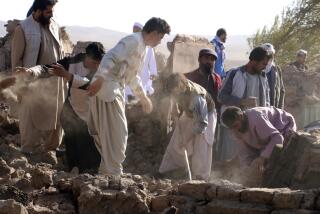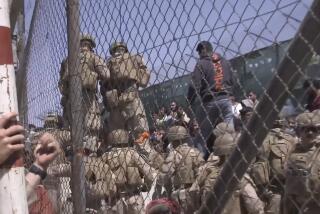Foreigners Lie Low in Wake of Kabul Bombing
KABUL, Afghanistan â The U.S. Embassy warned Americans in the Afghan capital to keep a low profile and the United Nations kept most of its staff home Monday as investigators searched for bodies and clues in the rubble of an American security firm torn apart by a bomb a day earlier.
Members of the Taliban, which claimed responsibility for Sundayâs blast, warned in telephone calls to news agencies that they were planning more attacks.
There was confusion Monday over the death toll at DynCorp Inc., which provides bodyguards for President Hamid Karzai and has been involved in training Afghan police. A spokesman for the NATO-led peacekeeping force that patrols the capital said six people had died, but a day earlier Karzaiâs office put the toll at seven.
DynCorp said three American employees were killed and two -- an Afghan and a Nepalese -- were missing. The slain Americans were identified as John A. Deuley, 36, of Rudy, Ark.; Robert J. Bifano, 57, of Panama City, Fla.; and Gerald W. Gibson, 57, of Bates City, Mo. An American from Virginia was seriously wounded and flown to Germany for treatment.
On Sunday, a Taliban spokesman claimed that the bomb had been placed in a vehicle and detonated by remote control. On Monday, squadron leader Peter Maskell of the peacekeeping force agreed that it had been remotely detonated and said investigators were trying to figure out what kind of explosives had been used.
One explosives expert, speaking on condition of anonymity, said the bomb appeared to have been made by someone with a strong technical knowledge of explosives.
âWhen you have fertilizer mixed with diesel or gasoline, the effect can be haphazard and the boom of the explosion is slower and longer,â he said. âThe explosion on Sunday was very quick and lasted a few seconds. That kind of a sound makes me think it was a bomb that would be used by a military in, for example, grenades, to ensure maximum impact on detonation. The hard force of the explosion also increases the amount of shrapnel flying in the air. This was a very carefully planned attack to ensure as many people as possible were hurt.â
In the wake of the blast, Nick Downie, security coordinator for ANSO, a nonprofit agency that advises foreign aid groups in Afghanistan on security, said his group expected âpossibly a series and a campaign of attacks.â
A spokesman for the Taliban, Mullah Abdul Hakim Latifi, warned that more bombings were in store as the nation prepared for its Oct. 9 presidential election.
âWe appeal to civilians to stay away from the elections and places where the Americans and [U.S.-led] coalition [forces] are living and working,â he told Associated Press. âThey are our priority targets.â
Sundayâs bombing was the deadliest attack in Kabul since September 2002, when at least two dozen people were killed in twin blasts near the Ministry of Information and Culture.
On Monday, all U.N. offices were closed, with only essential staff working. The U.S. Embassy e-mailed Americans, cautioning them to limit their movements and avoid bazaars, restaurants, government offices and military facilities.
At the blast site, investigators picked through debris in and around the charred hulks of half a dozen vehicles.
Twenty yards away, Mirwais Mirzad, 30, owner of a plumbing fixtures business, looked on in dismay as workers repaired the windows of his store.
âI think everything is finished,â said Mirzad, who had run a business in Pakistan in recent years and returned to Kabul because the situation had improved. Now he is not so sure. âIf it gets bad, I may have to close.â
Across the street, Rasoul Rouan, owner of a motorcycle shop, rejected the idea that the bombing was a political statement directed at Karzai.
âIt is not against Karzai,â he said. âIt is against the people of Afghanistan. They donât want people to live in peace. If they only wanted Karzai, they would get him.â
Mohammed Karim, who has sold sporting goods for 41 years in a shop a block from the blast site, said his store was full of customers when the bomb exploded. They fell to the floor to avoid flying glass.
âWe were very afraid,â he said. Karim said the attack was clearly connected to the election. But he doubted such bombings would prevent people from voting. âIt cannot stop the election,â he said.
At Ali Abad Hospital, 14-year-old Seraia Hamidi received a steady stream of relatives wishing her well. She had been washing grapes in her familyâs house near the DynCorp office when the bomb exploded, knocking her down, her mother said.
âI am very sad,â said Shala Hamidi, a medical school instructor. âMy house is very damaged. My daughter is hurt.... I wish the foreign people would change their location. Itâs a residential place, not a military post.â
Times staff writer Jube Shiver Jr. in Washington contributed to this report.
More to Read
Sign up for Essential California
The most important California stories and recommendations in your inbox every morning.
You may occasionally receive promotional content from the Los Angeles Times.










